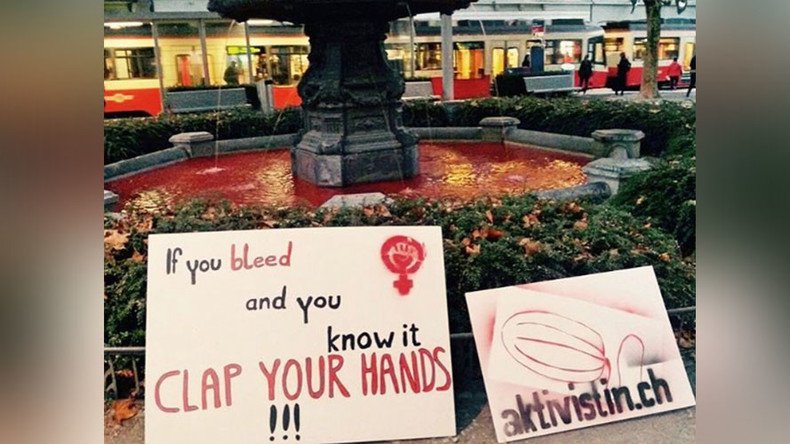Tampon tax protest turns Zurich fountains ‘blood’ red

Zurich commuters were left baffled after finding the city’s fountains had turned red Tuesday morning in what emerged was part of a demonstration to protest the tax on tampons in Switzerland.
#happytobleed und #aktivistinCHpic.twitter.com/wYJCRG7soG
— Christina Andersen (@Ch_S_Andersen) October 4, 2016
Activists dyed 13 fountains blood red as part of the #happytobleed action which sought to prompt a national conversation about how women’s bodies are perceived and the high rate of tax that is placed on tampons.
#happytobleed: Wir wollen einen Diskurs über den gesellschaftlichen Umgang mit dem weiblichen Körper! pic.twitter.com/NS4fnnzdc3
— Aktivistin.ch (@aktivistinCH) October 4, 2016
The demonstration was the work of Aktivistin.ch, a feminist group who used red food dye to color the fountains early Tuesday morning.
READ MORE: ‘Menstrual equity’: Tax-free tampons approved by Chicago City Council
“Many people still see menstruation as something shameful,” spokesperson Carmen Schoder told the Local. “Tampons are seen as a luxury product and women are financially disadvantaged.”
Zürich sieht rot #HappytoBleed#AktivistinCHpic.twitter.com/GwocvMb7Rd
— Nadia Huberson (@nadissime) October 4, 2016
Tampons and sanitary towels are taxed at 8 percent in Switzerland, far higher than the 2.5 percent at which most everyday items are taxed. The 8 percent tax is considered a luxury tax rate.
Aktivistin pointed to the fact that on average, women will have 444 periods in their lives.
Oh so Rot #happytobleed und #aktivistinCHpic.twitter.com/ARjvx3dy8J
— Christina Andersen (@Ch_S_Andersen) October 4, 2016
New York lifted its tampon tax in July following a protest and a class action lawsuit which was brought against the state. The move made tampons and other menstruation products exempt from state and local taxes.
READ MORE: NY women fight ‘tampon tax’ in court, accuse state of discrimination
“Women statewide will no longer be burdened by a lingering tax that was levied at a time when women were not part of government and the decision-making process,” Linda B Rosenthal, the bill’s sponsor said at the time.
My bill repealing #tampontax signed into law! We just axed the tax! Good riddance to sexist tax. @jweisswolf@JulissaFerreras@RepGraceMeng
— Linda B. Rosenthal (@LindaBRosenthal) July 21, 2016
Aktivistin.ch also seeks to draw attention to gender pricing, an issue that affects all women. Women’s products are typically priced higher than the male equivalent, from razors to moisturizers and toys.
muh wage gap and muh pink tax in a row. amazing. pic.twitter.com/pDPYDM2fL1
— shoe 🎀 (@shoe0nhead) October 1, 2016
The gender pricing, or ‘pink tax’, means women pay an average of 13 percent more than men for toiletries. Companies justify this inequality as women having a “greater willingness to pay.”












